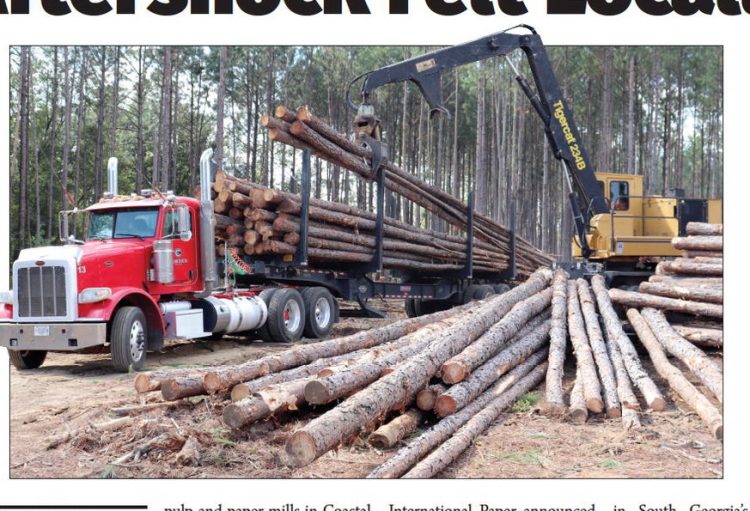Paper Mill Closings Aftershock Felt Locally


International Paper stunned the state last month, when they announced the closure of four pulp and paper mills in Coastal Georgia. Yet, local citizens and families are continuing to feel the aftershock of this announcement, as many businesses search for their future plans.
On Thursday, August 21, International Paper announced the permanent closure of the containerboard and packaging facilities in Savannah and the containerboard and timber and lumber operation in Riceboro. These mills have been a staple in South Georgia’s economy for years, as loggers and timber companies supply dozens of loads of lumber to the mill daily.
'These mill closures will uncontinued from page
doubtedly deal a devastating blow not only to Georgia’s timber industry, but to the economic fabric of the entire Southeast Georgia region,' emphasized Georgia Speaker of the House Jon Burns.
The pulp and paper industry has been buffeted by a long-term reduction in demand for its products. The number of mills in Georgia has fallen from 18 at the height of production in 1977 to just nine with Thursday's closure announcements, Marshall Thomas, president of Albany- based F& W Forest Services, told an audience of political and agriculture business leaders at the annual Ag Issues Summit at the Georgia National Fairgrounds in Perry.
Thomas said Georgia lawmakers are working to increase demand for timber products, including a state Senate study committee that began meeting last year to explore developing sustainable aviation fuel from biomass, which has become popular in Europe.
The effects of these closings are rippling through the region, as many individuals in the timber industry and large land tract owners are speaking out about the situation.
“Nobody saw it coming,” Bricoll LLC Owner Cody Alexander emphasized. “It’s nobody’s fault, but no one was prepared for this. Even the people who worked at the mill didn’t know until the morning it was announced.”
Alexander shared that the closing would not be detrimental to his business, as he sends lumber to other mills besides International Paper – but that the closures would change the timber industry in the area drastically. “It’s not just the workers at the mill that are effected – it’s everyone this way,” he remarked. “South Georgia is known for logging – this is going to hurt the banks and everywhere. It trickles down.”
He explained that large landowners would feel the effects through the decrease in prices of lumber. Due to the abundance of wood and fewer options of mills to take the lumber, loggers will have to adapt their businesses for the new set-up. Truck drivers and container haulers will have fewer loads to take on the road, and the number of employees in these businesses will need to be reduced. Due to this reduction in employees, insurance professionals who specialize in workman’s compensation will even feel the effects, according to Alexander.
Alexander gave the example that he knows one logging company that currently has three logging crews, but is only keeping one crew because of the cuts that they have to make from this closure. The number of logs that the crew hauls every week is also reducing from 120 loads to 50 loads.
He stated that local restaurant and recreation businesses, and even youth sports teams, could see some of the repercussions of the closures. “We try to sponsor whatever sports teams and all that we can. If I don’t have the extra money to give them, it’ll effect them, too,” Alexander continued. “When people lose their jobs, they don’t have extra money to spend at restaurants, stores, and bowling alleys. It changes everything.”
Timber Industry Professional Monroe Goss shared similar concerns, as he explained the price of timber would drastically drop. “It’s bad,” he commented. “Between those two mills, 2,500 loads of wood a week will have nowhere to go because all of these other mills – and there’s not many – especially the pulp wood mills – can’t absorb that,” he said. “You still will be able to sell and buy pulp wood, but it will be a huge change. You have to get used to it going from $15-$20 a ton to around $4-$5 a ton, which is where it was in the early 2000’s.”
He continued, “I’ll believe there will be dozens of loggers that will go out of business. Dozens – 40, 50, 60 – not just 5-10. It’s going to affect fuel – because you think about the fuel loggers buy. It’s going to affect the people that provide tires, hoses, and parts. It’ll even affect local taxes because every time timber is sold, the county receives a tax off of it.”
Gillis Ag & Timber Owner Ben Gillis spoke out about concerns, as he stated that he had never experienced a problem of this magnitude in his lifetime in the timber industry. “This is the biggest hit that South Georgia has taken in my lifetime,” he stressed. “It won’t just affect my business – it will affect Southeast Georgia. Most of our economy relies on timber, and the jobs and income from the mill.”
He said that though the mill’s closing announcement initially stated that 1,100 jobs would be directly affected and eliminated by the closure, the indirect effects of the closing were much greater than could be expressed. “It’s probably around 5,000-10,000 jobs that will feel the effects of the closure – everyone from loggers to insurance agents to part stores and banks,” he remarked.
Because of having a family legacy of working in the timber industry, Gillis stated that he had many people seeking guidance from him on how to handle the situation. “I have a lot of people looking at me about what’s next, and honestly, I don’t know. It’s going to forever change Georgia until we figure out how to replace it. The state is trying, but it takes time.”
Yet, amidst the chaos, Gillis still finds hope in the situation. “With a lot of hard work and persevercontinued from page
ance, we’ll overcome – it’s just going to take time,” he emphasized.
TAR Land and Timber Owner Tommy Rollins also spoke about the situation, reiterating that the pricing of timber – especially pulp wood – will decrease greatly.
“There’s still a need for it,” he emphasized. “Paper still has to be made, and we still need paper products. We still have Georgia Pacific and a mill down in Fernandina that will take pulp wood – it’s just going to be different.”
Rollins referred to the situation as a “short-time glitch,” as he stressed that the depletion of timber throughout the area from Hurricane Helene and the recent closure will strain the industry. “Short term, it’s not going to be conducive [for the timber industry],” he emphasized.
He continued, “There may be another industry that discovers that they can use pulp wood for something else – who knows. We grow timber faster and better here than everyone else – we just have to find a way to make a return.”
Rollins remains positive in the situation, as he shared that he had experienced a cycle of ups and downs of the timber industry throughout his years in business. “There will be a long-term effect, but we’ll live through it and make it through,” he reassured.
Effects are expected to continue to ripple through the area, as Interfor Corporation – which has mills in surrounding counties that accept lumber daily from local loggers – announced they will be reducing their lumber production by 12%, further crippling loggers and timber professionals.
The state legislature and government is actively working to find a solution to the effects of the closure, as State Representative Leesa Hagan has announced that State Speaker of the House Jon Burns has instructed the House Rural Development Committee – which is chaired by Hagan – to examine the impacts of the closure on rural Georgia in hopes of finding solutions for these issues.
“The closures of International Paper and Georgia-Pacific mills are a heavy blow to South Georgia families and communities,” commented Hagan. “Our focus must be on supporting hard-working employees, both those who worked in the mills and those whose jobs depend on them, and ensuring they have new opportunities close to home. The House Rural Development Committee is bringing all stakeholders to the table so we can listen, coordinate resources and take forward-thinking steps to strengthen Georgia's forestry industry and our rural economy.”
“Forestry has been an established fixture in South Georgia’s economy and communities for generations,” added Speaker Jon Burns. “The recent closure of several timber processing facilities across the region has dealt an unexpected blow to not only our foresters, but to the entire economic fabric of South Georgia. Despite the challenges ahead, the House Rural Development Committee is committed to leaving no stone unturned when it comes to supporting those affected directly by job loss, ensuring the long-term success of Georgia’s forestry Industry and strengthening rural Georgia’s economy.”





